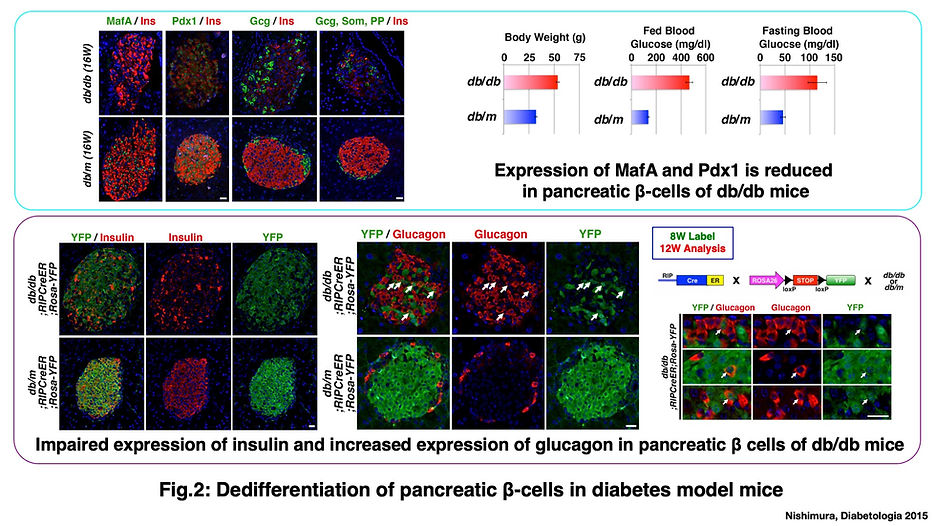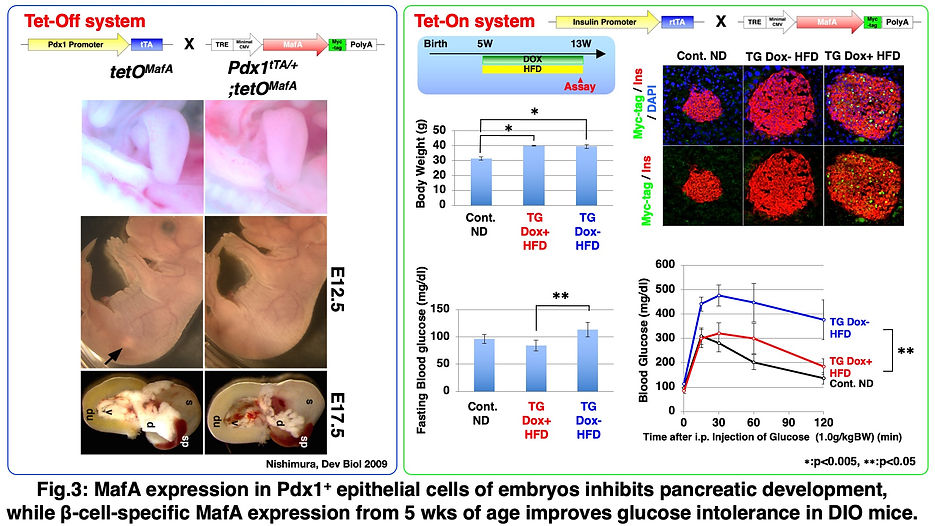top of page
Research Project
研究プロジェクト
<研究概要 / Research summary>
生命活動にとって重要な生体分子をコードする遺伝情報の発現は、限られた数の転写因子によって制御されています。これら転写因子は、発生分化や運命決定、形態形成などの生命現象だけでなく、細胞の増殖や機能、さらには疾患の分子メカニズムにも関わることが明らかになっています。当研究室では、網羅的な遺伝子発現解析結果に基づき、データ駆動型研究を推進することにより、生命機能に必須となる転写因子を同定し、遺伝子工学、分子生物学、あるいは細胞生物学的な手法を用いて、それら分子の構造や機能を明らかにすることにより、病態を分子レベルで解明することにより、人類の健康増進へ寄与することを研究目標としています。
The expression of genes critical for life activities is regulated by a limited number of transcription factors. These transcription factors are involved not only in biological phenomena such as development, differentiation, fate determination and morphogenesis, but also in cell proliferation and function, and even in the molecular mechanisms of diseases. Our laboratory promotes data-driven research based on the results of comprehensive gene expression analysis, to identify transcription factors that are essential for life activities. Our research goal is to clarify structure and function of these factors using genetic engineering, molecular biological, and cell biological techniques, which will result in elucidation of disease mechanism at the molecular level and contribute to improving human health.
<研究成果 / Achievement>
世界の糖尿病罹患者は2021年時点で5億3700万人と推定され、今後も増え続けると推測されています(IDF Diabetes Atlas, 2021)。膵β細胞は、血糖を下げるホルモンであるインスリンの分泌により、糖代謝を制御しています。糖尿病の多くを占める2型糖尿病では、末梢のインスリン抵抗性が増大し、膵β細胞の機能ならびに量が低下して、インスリン分泌が障害され、糖代謝異常が発生します。我々はこれまでに、インスリンの発現に重要な転写因子MafAが、膵β細胞の成熟分化や増殖に重要であることを明らかにしてきました(Nishimura 2006、Nishimura 2008、Nishimura 2009)。また、細胞系譜追跡実験などの結果より、MafA KOマウスの膵β細胞が脱分化しており(Fig.1)、MafAの発現が低下した糖尿病モデルマウスにおいても同様に、膵β細胞が脱分化していることから(Fig.2)、MafAは成熟膵β細胞の恒常性の維持に重要であることを示しました(Nishimura, 2015)。一方MafAは、5週齢のマウス膵β細胞特異的に発現させると、高脂肪食マウスの耐糖能異常を改善しました(Fig.3, Nishimura 2009)。
The number of people with diabetes worldwide is estimated to be 537 million as of 2021, and it is estimated that this number will continue to increase (IDF Diabetes Atlas, 2021). Pancreatic β-cells regulate glucose metabolism by secreting insulin. In type 2 diabetes, impaired function and quantity of pancreatic β-cells result in reduced insulin secretion and impaired glucose metabolism. We have shown that the transcription factor MafA, which is important for insulin gene expression, is critical for the differentiation, maturation and proliferation of pancreatic β-cells in embryos and neonates (Nishimura 2006, Nishimura 2008, Nishimura 2009). In addition, the results of lineage tracing experiments revealed that pancreatic β-cells in MafA KO mice were dedifferentiated (Fig. 1), and pancreatic β-cells in diabetic model mice with reduced expression of MafA were also dedifferentiated (Fig. 2), suggesting that MafA is indispensable for maintaining the homeostasis of mature pancreatic β-cells (Nishimura, 2015). Meanwhile, we also have shown that forced expression of MafA specifically in pancreatic β-cells of 5-week-old mice improves glucose intolerance in mice fed a high-fat diet (Fig. 3, Nishimura 2009).
<Selected publication>
Udagawa H, et al. Sci Rep13: 17958, 2023
Nishimura W, et al. Int J Mol Sci 23: 4478, 2022
Amo-Shiinoki K, et al. JCI Insight 6: 143791, 2021
Nammo T, et al. Diabetologia 61: 2608-2620, 2018
Nishimura W, et al. J Mol Endocrinol 55: 31-40, 2015
Asahara S, et al. Proc Natl Acad Sci USA 112: 8332-8337, 2015
Nishimura W, et al. Diabetologia 58: 566-574, 2015
Eto K, et al. PLoS ONE 9: e104184, 2014
Nishimura W, et al. Endocrinology 154: 4388-4395, 2013
Nishimura W, et al. Dev Biol 333: 108-120, 2009
Jiang Y, et al. Diabetes 57: 2718-2727, 2008
Nishimura W, et al. Dev Biol 314: 443-456, 2008
Nishimura W, et al. Dev Biol 293: 526-539, 2006



bottom of page
